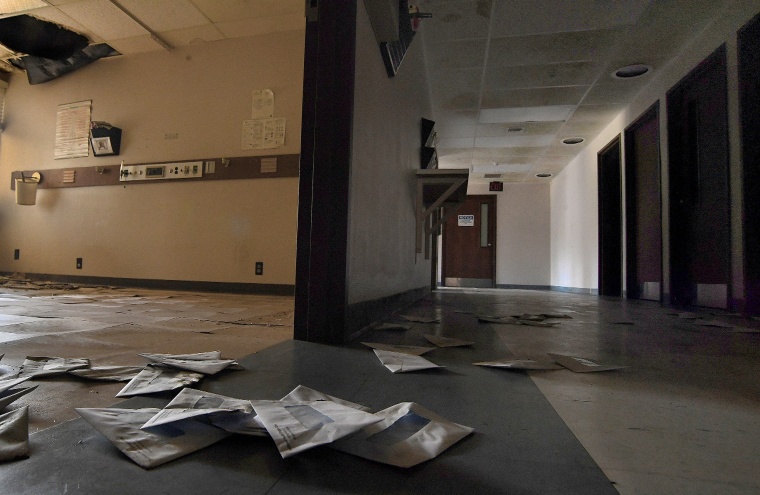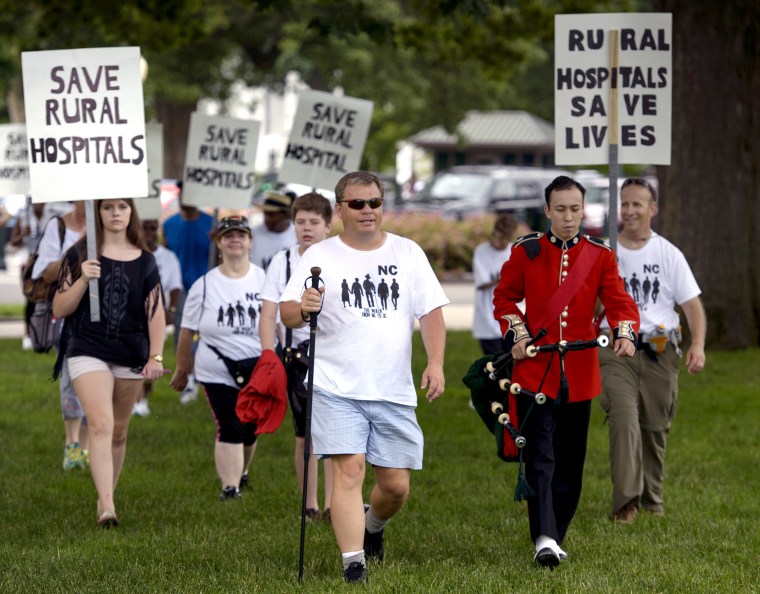More than 100 rural hospitals have closed in the United States since 2010 and another 430 are at risk of closing, which a new study says could have life-or-death implications for rural communities.
University of Washington researchers examined 92 rural hospital closings in California from 1995 to 2011. They found that while the closings of urban hospitals had no impact on their surrounding communities, rural closings caused their populations — which have limited access to health care and other services — to see mortality rates rise 5.9 percent.
That could have real implications for communities across the United States given that 113 hospitals have already closed since 2010 and more face financial difficulties, according to data compiled by the University of North Carolina.
“Rural closings increase travel times for patients, and lead to outmigration of health care professionals post-closure, severely dismembering patient access to care and exacerbating social disparities in health outcomes,” researchers Kritee Gujral and Anirban Basu wrote in their study.
The distance that ambulances have to travel to patients after a hospitals closes, as well as the limited number of ambulances in rural counties, means that residents there may have to wait for care after a car accident, heart attack or other health emergency, Dr. Nancy Dickey, president of the Rural and Community Health Institute at Texas A&M, said.
"There’s a golden hour of getting care in that first hour of trauma," Dickey said. "If you don't get care in that time, it can have a negative impact on morbidity as well as mortality."
Rural residents also often lack health insurance while their communities struggle with deteriorating hospitals and recruiting physicians, said George Pink, deputy director of the Rural Health Research Program at the University of North Carolina's Sheps Center. He added that many rural hospitals carry high financial burdens and the communities themselves are declining in population.
The population in nonmetro counties decreased by 200,000 people from 2010 to 2016, the National Advisory Committee on Rural Health and Human Services found, the first such loss ever recorded.
“These problems are exacerbated in rural areas, especially due to the recent economic downturns and job losses leading to outmigration and shrinking populations, leaving behind populations that are older, sicker and more reliant on Medicaid and Medicare,” the researchers wrote.
It’s also an issue that some believe is exacerbated in the 14 states that have refused to expand Medicaid — a perspective supported by a January 2018 study from the University of Colorado.
Researchers there studied hospitals' financial health and closings from 2008 to 2016 and concluded that hospitals in states that did not expand Medicaid saw a sharp increase of hospital closings, while states that expanded Medicaid saw closure rates decrease.

"So there is evidence to show that is true," Pink said, referring to to the Colorado study. "Anecdotally, I present a lot around the country and have found CEOs of hospitals are of mixed opinion. Some hospitals in California believe Medicaid expansion and the Affordable Care Act was the savior of many rural hospitals — you find diehard believers out there. CEOs in other states, even states that have expanded Medicaid, are less sanguine."
However, at least 180 of the 430 hospitals under threat of closing, according to a study by the consultancy firm Navigant, are in the 14 states with governments that have refused to expand Medicaid.
That also tracks with the level of rural communities that lack insurance, as a September 2018 Georgetown University Health Policy Institute study found that the uninsured rate for populations that live in rural areas and small towns in Medicaid expansion states fell from 35 percent to 16 percent from 2008 to 2016. In contrast, nonexpansion states only saw a decline from 38 percent to 32 percent over the same period.
It’s an important issue when the newest health care procedures are costly and rural populations have limited access to health insurance to reimburse hospitals — and many rural hospitals do not have the medical teams or equipment to deliver that quality of care.
"The kinds of things you can do in a small hospital has shrunk down substantially, and we have not taken the time and energy to say, ‘How do we revamp how we deliver health care when so much that we deliver is high-tech care?’” Dickey said.
That has become a point of contention in states like North Carolina, where Democrat Gov. Roy Cooper's push for Medicaid expansion remains a standoff between him and the Republican-controlled legislature.
Meanwhile in Mississippi, it has become a prime point of debate between gubernatorial candidates Jim Hood, the Democratic state attorney general who supports expansion, and Tate Reeves, the state’s Republican lieutenant governor who opposes it.
The two men square off in November in a state where nearly half of its rural hospitals are at risk of closing and in an election that is bound to be contentious over an issue that for some is political rather than medical.
"Your conclusion on this issue often depends on what state you’re in," Pink said, "and the political ideology of the person you’re talking to."

